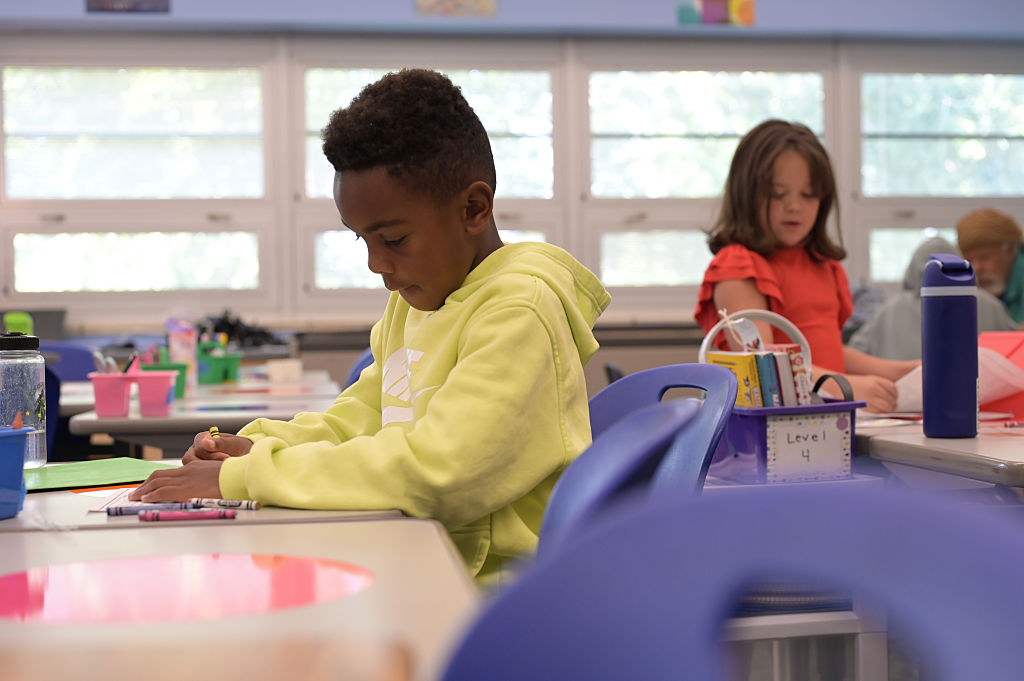Private Equity Is Set to Profit From New School Vouchers
The school voucher provision in Donald Trump’s Big Beautiful Bill is expected to transfer billions of dollars to private schools and companies that contract with public school districts. That includes companies owned by private equity firms.

Of the billions expected to be funneled into companies that own and run private schools and contract with public school districts, a substantial amount could go to private equity firms. (Hyoung Chang / The Denver Post)
President Donald Trump’s Big Beautiful Bill is poised to accelerate the privatization of the nation’s school systems — and private equity aims to cash in. By some estimates, the law’s new school voucher provision — which uses public funds to help parents pay for private school tuition — is expected to transfer anywhere from $4 billion to $51 billion to private schools and companies that contract with public school districts. That includes companies owned by private equity firms.
Thanks to the provision, starting in late 2026, individuals can contribute up to $1,700 to qualifying “scholarship-granting organizations” and receive a 100 percent tax credit in return, entirely bankrolled by the federal government. The organizations involved can award scholarships to families with incomes at or below 300 percent of the median area income (which in some places amounts to more than $350,000) to cover expenses such as tuition and school supplies.
No other cause — including children’s hospitals or disaster relief — provides such a reimbursement, awarding a tax credit roughly triple what taxpayers would receive from donating to other charitable organizations.
School voucher programs have been hotly debated since their inception. They emerged as a means to preserve Jim Crow–era race relations after Brown v. Board of Education ruled that separating public schools by race was unconstitutional. While supporters argue that vouchers increase education opportunities for families, opponents say that these programs drain funds from public schools while delivering worse academic outcomes and can promote religious indoctrination.
While the new school voucher program allows public school students to use the funds for things like transportation and school supplies, some experts worry that it still ultimately diverts public funds into private hands without significant upsides.
“There’s a lot of energy from private companies convincing schools that outsourcing will be cheaper, will make it so that schools have less to manage,” Azani Creeks, senior research and campaign coordinator at the Private Equity Stakeholder Project, told the Lever. “But there’s a lot of evidence that shows that outsourcing often costs the same amount, if not more, than keeping services in-house.”
Of the billions expected to be funneled into companies that own and run private schools and contract with public school districts, a substantial amount could go to private equity firms.
One such firm is KinderCare, a for-profit childcare and early education company, which, despite going public last year, is still majority-owned by the Swiss-based private equity firm Partners Group.
While it’s difficult to estimate the extent of the funding received until the bill goes into full effect, the company expects to benefit from the provision. In a June 28 filing with the Securities and Exchange Commission, KinderCare reported that the bill included the “restoration of favorable tax treatment for certain business-related provisions” that is “expected to be favorable to the Company.”
Despite receiving significant federal funding, KinderCare has increased tuition at a steep rate and delivered bloated pay packages to its executives. In 2024, 35 percent of the company’s revenue came from tuition subsidies, while its annual tuition increases over the past three years vastly outpaced inflation. KinderCare CEO Paul Thomas and chairman Tom Wyatt earned $21 million and $58 million, respectively, last year.
It’s not just firms involved with private schools that stand to benefit. There are numerous companies that contract with public schools to provide services such as food and transportation that will likely win big from the voucher provision.
One company is First Student, the country’s largest student transportation service provider. In 2021, the company was acquired by Swedish investment giant EQT, the second-largest private equity firm in the world.
In a lawsuit against the company, the San Francisco Unified School District alleged that First Student submitted false invoices to the district, claiming that buses and drivers were on the road while students were learning remotely. And in 2022, the company charged double-digit rate increases to Illinois’s Unit 5 school district. One consultant found that the Illinois district could save anywhere from $5 million to $8.3 million over the next decade by insourcing transportation.
Not all states are embracing the new school voucher program. New Mexico governor Michelle Lujan Grisham (D) and Illinois governor J. B. Pritzker (D) have chosen not to opt in their states, while Wisconsin’s governor Tony Evers (D) was recently lambasted in a Wall Street Journal editorial for his decision to opt out.
As the debate over school vouchers wages on, Creeks suggests that Wall Street is looking for other ways to profit from the upbringing of the country’s youth. She argues that even well-meaning initiatives like New Mexico’s universal childcare program could end up benefiting large companies more than the people they’re meant to serve without sufficient boundaries in place.
“Even when there might be all these good intentions behind this legislation that opens up these huge pools of money, the ones that win are going to be the larger companies that have all these resources,” Creeks said. “These things are not being implemented with a lot of guardrails around them about how the funds can be used and who ends up benefiting.”